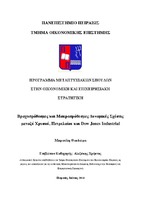| dc.contributor.advisor | Αλεξάκης, Χρήστος | |
| dc.contributor.author | Μαρούλη, Θεοδώρα | |
| dc.date.accessioned | 2016-02-09T08:02:44Z | |
| dc.date.available | 2016-02-09T08:02:44Z | |
| dc.date.issued | 2014-06 | |
| dc.identifier.uri | https://dione.lib.unipi.gr/xmlui/handle/unipi/8380 | |
| dc.description.abstract | Σκοπός αυτής της εργασίας είναι η εξέταση των βραχυχρόνιων και μακροχρόνιων δυναμικών σχέσεων μεταξύ τριών πολύ ισχυρών περιουσιακών στοιχειών, του χρυσού, του πετρελαίου (WTI) και του χρηματιστηριακού δείκτη Dow Jones Industrial Average, για τη χρονική περίοδο Ιανουάριος του 2000 μέχρι και Μάιος 2013. Αρχικά, θα παρουσιαστούν αναλυτικά κάποια ιστορικά στοιχεία για τις τρεις μεταβλητές αλλά και για το πως συμπεριφέρονται σαν επενδυτικά προϊόντα. Στη συνέχεια, θα αναπτυχθεί η Υπόθεση της Αποτελεσματικής Αγοράς καθώς και οι μορφές που μπορεί να λάβει. Εμπειρικές μελέτες που έχουν πραγματοποιηθεί από διάφορους ερευνητές αποτυπώνονται αναλυτικά, καθώς και ορισμένα συμπεράσματα προκύπτουν μέσα από αυτές. Στο τρίτο κεφάλαιο, θα αναλυθούν οι δυο σύγχρονες μέθοδοι της οικονομετρικής ανάλυσης, η αιτιότητα κατά Granger και η Συν-ολοκλήρωση. Το θεωρητικό πλαίσιο των οικονομετρικών αυτών μεθόδων αναπτύχθηκε προκειμένου να εξεταστεί η ύπαρξη αιτιώδους σχέσης μεταξύ των τριών μεταβλητών, τόσο σε βραχυχρόνιο ορίζοντα, όσο και σε μακροχρόνιο. Με άλλα λόγια, η συγκεκριμένη έρευνα προσπαθεί να εντοπίσει, αν η αγορά είναι αποτελεσματική στην υπό εξέταση περίοδο και αν μπορεί κάποιος επενδυτής να κερδοσκοπήσει. Τα αποτελέσματα που προκύπτουν είναι, ότι η αγορά είναι αποτελεσματική σε μεγάλο βάθος και πλάτος για τη συγκεκριμένη περίοδο. Υπάρχουν ασθενείς στατιστικές σχέσεις μεταξύ των τριών περιουσιακών στοιχείων και δεν είναι σε θέση να χρησιμοποιηθούν εναντίον της αγοράς. | el |
| dc.format.extent | 79 | el |
| dc.language.iso | el | el |
| dc.publisher | Πανεπιστήμιο Πειραιώς | el |
| dc.rights | Attribution-NonCommercial-NoDerivatives 4.0 Διεθνές | * |
| dc.rights.uri | http://creativecommons.org/licenses/by-nc-nd/4.0/ | * |
| dc.subject | Χρηματιστηριακές συναλλαγές | el |
| dc.subject | Χρυσός | el |
| dc.subject | Πετρέλαιο | el |
| dc.subject | Gold | el |
| dc.title | Βραχυπρόθεσμες και μακροπρόθεσμες δυναμικές σχέσεις μεταξύ χρυσού, πετρελαίου και Dow Jones Industrial | el |
| dc.title.alternative | Short and long-term dynamic relationships between gold, oil and Dow Jones Industrial | el |
| dc.type | Master Thesis | el |
| dc.contributor.department | Σχολή Οικονομικών, Επιχειρηματικών και Διεθνών Σπουδών. Τμήμα Οικονομικής Επιστήμης | el |
| dc.description.abstractEN | The purpose of this paper is to examine the short and long-term dynamic relationships between the three very strong assets: gold, oil (WTI) and the stock index Dow Jones Industrial Average, for the period January 2000 to May 2013. Initially, it will be presented a detailed historical recursion for the three variables and how they behave as an investment product. Then, it will be developed the Efficient Market Hypothesis and the forms it takes. Empirical studies have been conducted by various researchers captured and conclusions arising from these instruments. The third chapter will analyze the two modern methods of econometric analysis, Granger causality and Co-integration. The theoretical framework of these econometric methods developed to examine the causal relationship between the three variables both in the short term and in the long term. In other words, this research seeks to identify whether the market is efficient in the period under review and if an investor can make an extra profit. The results are that the market is efficient in large depth and width for that specific period. There are powerless statistical relationships between the three assets and are not able to be used against the market. | el |
| dc.contributor.master | Οικονομική και Επιχειρησιακή Στρατηγική | el |
| dc.subject.keyword | Dow Jones Industrial Average | el |
| dc.subject.keyword | Υπόθεση αποτελεσματικής αγοράς | el |
| dc.subject.keyword | West Texas Intermediate | el |
| dc.subject.keyword | Oil | el |
| dc.subject.keyword | Efficient Market Hypothesis | el |



